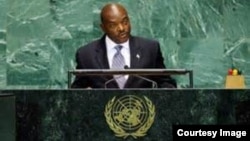A spokesman for Burundian President Pierre Nkurunziza said the opposition is afraid of the president’s popularity, and that is why they keep pressing him about whether he is going to seek a third term or not.
Deputy presidential spokesman Abayeho Gervais has said Nkurunziza will stand for a third term in the June 2015 election if he is chosen by his ruling CNDD-FDD party.
But Agathon Rwasa, leader of the former Burundian rebel National Liberation Front (FNL) and now head of the largest opposition group, told VOA recently that President Nkurunziza should take advantage of all the privileges guaranteed him under the constitution by leaving power peacefully and not try to change the constitution for a third term.
Gervais said the opposition should devise strategies to defeat the ruling CNDD-FDD party and not an individual.
“In the CNDD-FDD party, an individual does not decide by himself that he’s standing on his party’s ticket. There must be a congress which will put his name forward that he represents the party. This congress has not taken place,” he said.
Gervais said the CNDD-FDD party congress will be held probably in April, and the world would know the truth.
He rejected any suggestion that what happened in other countries like Burkina Faso and the Democratic Republic of Congo could happen to Burundi if President Nkurunziza decides to seek a third term.
“Burundi is Burundi; Burundi should not be taken as any other country. You are talking about countries that have changed their constitutions. Burundi has not changed its constitution. A bill was tabled in the parliament and the vote in the parliament could not allow this move to happen. So there has not been any move,” Gervais said.
Another presidential spokesman, Willy Nyamitwe, warned earlier this month that those who would want to protest against any decision by President Nkurunziza to seek a third term will be considered troublemakers and treated as such.
Opposition leader Rwasa told VOA earlier this month that it would be unwise if Burundian security forces use violence against citizens.
Gervais said the opposition is afraid of President Nkurunziza because they know how popular he is with the people of Burundi.
“They know that he is somebody who has steered this country out of war, out of conflict, out of ethnic division, and out of all the problems we have had in the past. In actual fact, the opposition should not have any problem with an individual. They should have a problem with the party. They should set up mechanisms to defeat the party, not the individual,” Gervais said.
While Burundi’s constitution only allows a president to serve for two terms for a total of 10 years, President Nkurunziza has reportedly said that he has only been directly elected by the people once.
Gervais cited the 2000 Arusha Peace and Reconciliation Agreement for Burundi which states that “after the signing ceremony, transitional institutions would be established within six months, including a transitional government of national unity, and that general elections would be held within 30 months to form a new government.”
“There are two things in the Arusha Accord and in the constitution whereby they set the term limit to two, and then there is another section of this fundamental text where it said that the president must be elected by the people. Now, in the first term the president was elected by the parliament. He was only elected by the people only once,” Gervais said.
He said Burundian lawmakers will review the two documents and explain to the world whether President Nkurunziza can seek another term or not.
The opposition has also been complaining about what it called the “militarization of the ruling CNDD-FDD party’s youth wing,” known as Imbonerakure, and has accused the government of supporting the violence.
But Imbonerakure Chairman Denis Karera reportedly described the allegations as “erroneous and inflammatory information circulated by people motivated by their own interests and who want to disorientate the population.”
The U.N. Security Council on February 19 stressed the “crucial need for a free, transparent, credible, inclusive and peaceful electoral process" in Burundi.





